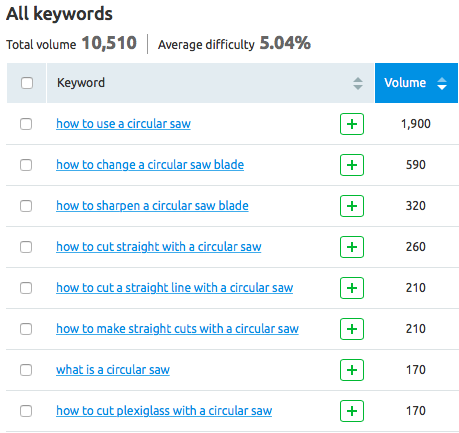
According to a recent study by eMarketer, 9 out of 10 B2B businesses in the United States use digital content marketing. It’s not only an industry best practice, but quite often a competitive requirement to run content marketing campaigns either in-house or with the help of an agency.
If you’re not applying keyword research to your content marketing, it’s time to start. Keyword research can help you create assets your customers are searching for, driving traffic to your website and building brand authority on the topics your target market cares about.
The Basics
Content marketing is a branch of online marketing that helps attract users to a company’s website.
Some common examples of content include articles on a company’s blog, videos, or infographics. By sharing content, a company doesn’t aim to advertise to a broad audience, but targets precisely the users who are already searching for something related to the business.
Let’s say your company sells power tools online. Your content marketing process might look something like this:

There are a lot of “IFs” when it comes to content marketing.
- You can post content only IF you run a content platform: a corporate blog, forum, or social media.
- The user will see your page in search results only IF you rank high enough for the their search query — the keyword that they type in the search field. Ideally, you should be on the first page of the search results.
- The user will make a purchase only IF you convince them that your product is what they are looking for. Needless to say, nowadays, it’s unacceptable to be pushy in your writing.
Regardless of the challenges — and perhaps, in part, because of them — content marketing is a very effective means of attracting users to a website. This is the main reason why companies run blogs and invest in social media marketing: to attract potential customers. The noble intention of sharing valuable knowledge with the world usually comes second.
Keyword Research in Content Marketing: The Context
Any piece of content you create should be designed for your target audience, so it has to be relevant to their interests - or better, satisfy their intent. This concept, broadly popularized by Google, is described as the intention of the user when they open their browser on the search page.
You can’t know for sure what your readers will be interested in, but you can know what they are looking for now. This is the main implication of content creation: you assume that users will be interested in a certain topic based on the information that a sufficient number of users are already interested in it. Though this involves some educated guesswork, big data provides the necessary insights.
Keyword research is how you discover what your potential readers are searching for.
Keyword search volumes — the average amount of search queries for a certain keyword in a particular geographical location — can give you an indication of how much demand there may be for a given topic or query and help you decide where to focus content creation efforts.
There are plenty of online tools that help you find the most popular and relevant keywords, from Google’s own Keyword Planner to multiple other providers with independent calculation mechanisms, including SEMrush.
Applying Keyword Research to Content Marketing: The Application
Keyword research traditionally involves three major steps:
- Defining the core topics that you will be writing about.
- In the example above, it could be “power tools” and “DIY.” This list can consist of more search terms, which we call seed keywords or seeds.
- Expanding the list of seed keywords with the help of a keyword research tool.
- Running competitive research to select the keywords that have the best potential.
Usually, these keywords have a combination of high volume and low competition level.
Step one is typically pretty straightforward — a quick brainstorm is usually enough. You already know what your business provides.
For the last couple of steps, you’ll need to use specific tools that can show related keywords and keyword volumes, and are capable of filtering the results to help you decide precisely which keywords to target.
At SEMrush, we have developed Keyword Magic Tool for keyword research. It’s easy to use, even for beginners, and provides multiple valuable insights useful to even experienced content strategists.

For example, if you enter the seed keyword “circular saw,” the tool generates 12,615 relevant keywords.
The Keyword Magic Tool groups them by the number of words in a keyword phrase, displays search volumes for the past month, provides keyword difficulty (which indicates how strong is the competition for this keyword), and indicates whether this keyword triggers any SERP features — for instance, Featured Snippets, Top Stories or Local Packs.
But one of the biggest advantages of the tool is its ability to show you the most commonly-searched questions related to your seed keywords. By addressing these specific questions in your content, you provide valuable information to the user and satisfy their search intent with an answer — what they intended to find when they began their search.

There is a lot of information on how to choose the right keywords for your business on Google’s official support page, or on the blogs of the keyword research tools providers. You can find ours on semrush.com/blog.
Keyword research boosts the effectiveness of your content marketing, and it’s simple to implement as long as you have the right tools. Once you understand which metrics to look for and how to use the tools, it’s not difficult to incorporate keyword research into your content marketing and reap the SEO and brand-building benefits. Try adding a few extra steps to include keyword research in your content creation workflow — they’ll add significant value to your assets.

